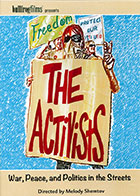
The Activists: War, Peace, and Politics in the Streets 2017
Distributed by Bullfrog Films, PO Box 149, Oley, PA 19547; 800-543-FROG (3764)
Produced by Melody Shemtov, Michael T. Heaney, and Marco Roldán
Directed by Melody Shemtov
DVD, color, 60 min.
High School - General Adult
Activism, Social Movements
Date Entered: 08/23/2017
Reviewed by Andy Horbal, University of Maryland LibrariesIn the aftermath of the 9/11 attacks on the World Trade Center in New York, a global antiwar movement was born to protest American military action in Afghanistan and Iraq. As documented in Party in the Streets: The Antiwar Movement and the Democratic Party after 9/11, a 2015 book by The Activists producer Michael T. Heaney, the scale of these protests was unprecedented, with individual events held between 2002 and 2006 regularly drawing crowd sizes numbering in the hundreds of thousands, including the “largest internationally coordinated protest in all of human history” on February 15, 2003. They were documented extensively by the news media and attracted colorful individuals from all walks of life: anyone who attended a protest during this time likely encountered hundreds of examples of extraordinarily creative signs and costumes, street theater, and puppetry. Although this would seem to be fertile subject matter for fiction and nonfiction filmmakers alike, the ground remains largely untilled.
With every option still on the table, it is understandable why The Activists feels like a film that can’t quite decide what it wants to be. On the one hand, the impassioned reading of a passage by Frederick Douglass and a title card defining “activists” broadly as “people involved in action with the goal to bring about social, political, environmental, or other intentional change” which begin the film reflect an ambition to be comprehensive and situate the early-mid 2000s antiwar movement within a larger history, as do the inclusion of pro-war opposition voices, montage sequences of archival footage, a segment documenting former President Barack Obama’s rise to prominence, and the decision to end by talking about the Arab Spring uprisings and Occupy Wall Street movement. On the other hand, the overwhelming majority of the film concentrates specifically on the period between 9/11 and President Obama’s first inauguration in 2009, while profiles of individual activist organizations like Code Pink, Iraq Veterans Against the War (IVAW), and the Granny Peace Brigade and explorations of how leaders of the antiwar movement like Students for a Democratic Society founder Tom Hayden, United for Peace and Justice founder Leslie Cagan, and IVAW founder Geoff Millard got involved in activism betray a desire for an even more granular focus.
Had director Melody Shemtov opted for a feature film-length running time, this approach might still have worked. Crammed into a single hour, though, almost everything feels rushed. Most glaringly, the montages (one combines stock war footage accompanied by the song “War” by Edwin Starr, and the other blends footage from the Vietnam era with a generic-sounding acid rock guitar riff) are familiar to the point of cliché, the treatment of pro-war counter-protestors is so cursory that the The Activists would be better off without these scenes entirely, and there’s no discussion of why the handful of organizations highlighted in the film were chosen from the more than 2,000 that Heaney estimates were involved in the antiwar movement.
For these reasons, The Activists is hard to recommend to anyone but activist groups hosting a movie night who care more about subject appropriateness than they do about execution. Teachers and students interested in the antiwar movement would be better served by supplementing books like Party in the Street and contemporary newspaper and magazine accounts with the thousands of hours of antiwar protest footage available on YouTube. Extras include 45 minutes of extended interviews Hayden, Cagan, and ANSWER Coalition national coordinator Brian Becker.